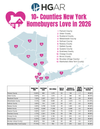ALBANY—New York Gov. Kathy Hochul announced on Nov. 7 the findings of the New York State Tariff Disruptions Report, a statewide analysis documenting the impacts caused by the Trump Administration’s tariff policies. The report outlines that tariffs are imposing an effective 21% tax on imported goods, costing New York families an estimated $4,200 annually.
Additionally, inflation is nearly 52% higher than the 10-year average. These tariffs have generated price surges across critical sectors and are threatening to reverse years of economic growth and job creation in New York State.
The report stated: The NYS Department of Labor (DOL) estimates there are 500,000 jobs exposed to negative impacts from tariffs. These jobs are largely within key sectors, including food manufacturing, computer and electronics manufacturing, and metal manufacturing. Even workers whose jobs remain secure typically do not benefit from tariffs. Studies of the 2018 tariffs found they increased prices and profits, but wages only increased by a little over $1 per week.”
“New Yorkers are seeing firsthand what these tariffs really are—a tax on hardworking families and employers,” Gov. Hochul said. “Under my leadership, the state’s economy was growing in all areas. We achieved record tourism numbers, a private sector job growth rate that outpaces the nation, and unprecedented commitments from businesses to grow jobs. Tariffs are threatening to undermine all of this. They raise prices on everything from milk and medicine to steel and housing materials, while doing nothing to strengthen our economy. Tariffs are destabilizing markets, straining small businesses, and punishing the very people who keep our state moving.”
As directed by the governor, New York State agencies were required to investigate and report the economic and social impacts of federal tariffs. This coordinated response, ordered through a July 14, 2025, directive from the Governor’s Office of State Operations, tasked Empire State Development and the Office of General Services with leading a cross-agency analysis covering cost increases, supply chain disruptions, and threats to jobs and small businesses across New York’s economy.
Preliminary results demonstrate that tariffs have already caused some setbacks in multiple sectors.
Agriculture: Farms statewide face higher expenses for fertilizer and equipment. One farmer indicated that his business faces increases of up to $20,000 annually, while milk exports have fallen 7%.
Construction: Material costs have climbed by 15–25%, impacting housing and infrastructure projects across the state.
Tourism: Reduced Canadian travel led to nearly 400,000 fewer visitors to New York in May of 2025 as compared to May 2024, cutting deeply into a sector that employs one in ten New Yorkers.
Health Care: Tariffs on imported equipment and pharmaceuticals have forced increased costs and caused strain on operations and have raised premiums for state employee health plans by $14.5 million.
Manufacturing: Input costs have risen 20%, cutting profit margins and delaying investments for hundreds of New York manufacturers reliant on cross-border supply chains.
In terms of industries tied to construction, the report found that material costs have climbed by 15%–25%, adding around $11,000 to each new single-family home, impacting housing and infrastructure projects across the state.
Housing Infrastructure
Recent estimates indicate tariff actions will add approximately $11,000 to the cost of building each new single-family home.
The NYS Homes and Community Renewal (HCR) reports that while the full impact of the tariffs on the housing market will be more evident by early 2026, rising prices are already creating challenges. In one financed project, HCR reported an $18,000-increase in the cost of a single elevator, and an additional $370,000-increase for essential building supplies.
“This escalation in construction costs, driven by tariffs, will inevitably result in fewer new homes built and, consequently, reduced access for homeownership across New York State,” the report stated.
Transportation Infrastructure
Tariffs on steel, aluminum, and other key construction materials drive up the cost of both new projects and critical repairs to existing infrastructure, stretching public budgets, and potentially delaying needed improvements. These rising costs risk creating longer project timelines and increased burdens on taxpayers.
Steel and aluminum are essential for rebar in concrete, structural frameworks (bridges, overpasses), guardrails, signs, and other essential transportation infrastructure. Steel tariffs were raised in June 2025 to 50% from the previous level of 25%, leading to increased costs for construction and infrastructure projects that use significant amounts of imported steel.
Tariffs on foreign goods can also reduce pressure for American companies to keep their prices low. Despite not being subject to tariffs, two large American steel producers reported in July that they were charging more for their products in the second quarter of 2025 than in the first quarter of 2025.
Asphalt has also been subject to price increases, potentially affecting road maintenance repair projects across the State. The New York State Department of Transportation reports costs increasing from $591 per ton to $646 per ton (over 9% increase or 5.9% increase when seasonally adjusted) from January 2025 to July 2025.
Copper, used in electrical wiring for traffic signals, lighting, rail systems, and other transportation infrastructure, has significantly increased in cost. In September 2025, copper cost approximately $4.50 per pound, as compared to only $3.25 in July 2024, a 38% increase.
Tariffs are also impeding New York’s ability to implement clean and efficient electric public transportation. NYSDOT reports that manufacturers for electric buses are estimating a $13,000 tariff-related cost increase per bus on top of previously negotiated prices. This significant cost hike delays the modernization of public transit infrastructure and impedes the state's progress toward its emissions reduction goals, the report stated.
The full tariff report can be found at: https://www.governor.ny.gov/sites/default/files/2025-11/Tariff-Report.pdf








